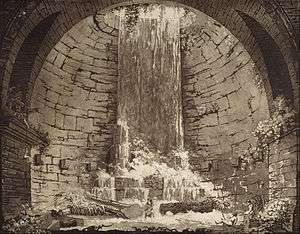Gaspare Galliari
Gaspare Galliari (1760–1818;[1] some sources give 1761[2] for the year of birth or 1823[3] for the year of death) was an Italian painter.

Rotunda converted as baths, original by Galliari, engraved in 1803 by Luigi Rados
He was born at Treviglio, and died at Milan. In the Brera at Milan is a view of Venice by him.
He is described as a master of scenography, painting scene bernesche and capricci.[4]
Gaspare was the son of Gian Antonio Galliari. He was born into a large family of artists:
- Giovanni Galliari d’ Andorno-Cacciorna, painter.
- Bernardino Galliari (1707–1794), first son of Giovanni, figure painter. Painted in Berlin Theater, also painted various theaters and curtains in the Milan area. Died in Andorno.[5]
- Fabrizio Galliari (1709–1790), second son of Giovanni, quadraturista.He painted in many churches and palaces. He painted the cupola of the Cathedral of Vercelli. In 1778, he became professor at the Albertina Academy. Born in Andorno, died in Treviglio.[6]
- Gian Antonio Galliari (1718–1783), third son of Giovanni, still-life painter of flowers. Born in Andorno, died in Milan.[4]
- Giovannino Galliari, son of Fabrizio, quadraturista, travelled to Paris and Berlin, painted the duomo at Biella, and a salon in the Turin Academy of Sciences, died in 1819 in Treviglio.[4]
- Giuseppino Galliari, son of Fabrizio, Mannerist figure painter, scenographer, died in 1817 at Milan.[4]
Notes
- "Gaspare Galliari". National Museum of Catalonia. Retrieved 12 December 2016.
- "Gaspare Galliari (1761-1823)". Bibliothèque nationale de France. Retrieved 12 December 2016.
- "Gaspare Galliari (Treviglio c. 1760-1823 Milano)". Christie's. 2008. Retrieved 12 December 2016.
- Istoria Della Vercellese Letteratura Ed Arti, Volume 4. (1824) Gaspare De Gregori, page 370.
- G. De Gregori, page 366.
- G. De Gregori, page 369.
gollark: Yes; pure water is exactly neutral.
gollark: Why? SCIËNCE.
gollark: 7 is neutral. <7 is acid. >7 is alkaline.
gollark: Well, yes.
gollark: Water with dissolved minerals can be.
References

This article is issued from Wikipedia. The text is licensed under Creative Commons - Attribution - Sharealike. Additional terms may apply for the media files.